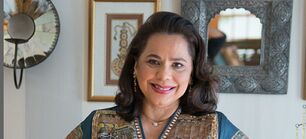weekly column
|
Each week, find a commentary on something connected to verses of Torah or another source of wisdom
|
|
Each week, find a commentary on something connected to verses of Torah or another source of wisdom
|
 Wisdom Wherever You Find It It is our ordinariness that connects us. Salma Hasan Ali Some might deny it, but every religion in the world starts from the presumption that it is the best. Otherwise, why believe? It is true of religions in the classical sense – those with divinely revealed scriptures or cosmically imparted values – and it is true of religions that claim not really to be religions – secular philosophies, pagan communities, even the Pastafarians (look it up). The old joke about two litigants who make their case to a rabbi applies here. He listens privately to the first one and says, “You’re right.” The second one takes a turn and the rabbi says, “You’re right.” His wife, listening to the proceedings, admonishes her husband that they can’t both be right. The rabbi responds, “You’re also right.” These deeply held convictions are usually kept at bay in polite company. They are also concealed with a veneer of collaboration in interfaith councils that seek the widest possible membership. In the end, no matter how compelling the argument, Christians won’t give up Jesus, Muslims won’t accept a different Prophet, Buddhists won’t affirm a deity, atheists won’t accept an external source of morality, and Jews won’t stop insisting that we are a people, not only a religion. We all may affirm the meaning of your belief system as profoundly meaningful to you, but still at least one tick short of what we ourselves believe. No answer is universal. But Ali is correct when she insists that it is our ordinariness that connects us. The elaborate and powerful teachings that make up our belief systems may keep us apart. But we make a mistake to focus on them when we are looking for connections. The questions are what bind us together. Maybe it is a mistake to try to list some of them here because I will inevitably leave out the one most important to you and maybe everyone else who isn’t me. But if you think about the matters that trouble your heart – not in a debilitating way, but as a matter of existential curiosity – my guess is that the challenges we face every day in the midst of our ordinariness give us far more in common than the answers we pursue individually and collectively with such ferocity. Mostly they are questions of meaning. Why am I alive? Do I have a purpose? Am I loved? Can I love? What is truly important? Are we alone? What should I fear? The combination of collective wisdom, predisposition, and cultural immersion leads us to responses that divide us into groups that provide us with rituals and symbols designed to make us tentatively satisfied with responses. For a time, shorter or longer, we are satisfied. But that satisfaction is what so often leaves us suspicious of others who have reached different conclusions. They are probably wrong. But what if they are not? At the core of our humanity are the common concerns that lead us to seek the answers. The questions are ordinary, and they rest on the heart of young and old, spiritual and secular, familiar and exotic, local and distant. Our everyday worries and our ultimate ones are a far greater indication of what we share with others than the answers we choose that deceive us into believing one size fits all. Don’t be insulted by being ordinary in your concerns. As Salma Hasan Ali suggests, it is what connects us to each other. There is plenty of room to be extraordinary – even unique – in the ways you find to address your questions. But I hope you also find solace in knowing that for all the disagreements and conflicts we face in our fractious society today, taking a step back from the frantic efforts to proclaim an undisputed answer leaves us standing together with people of all persuasions who are connected by ordinary questions with which we all grapple.
0 Comments
Leave a Reply. |
Archives
October 2023
Categories |